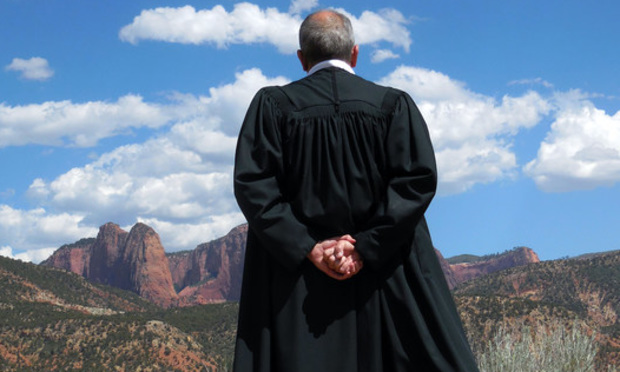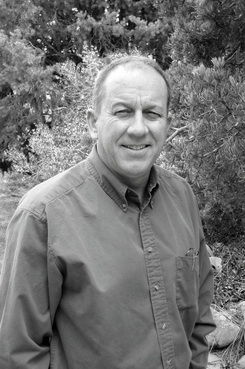Gavel-Traveling Judge Is Geared Up for National Parks Duty
U.S. Magistrate Judge Robert Braithwaite's jurisdiction is unlike any other in the country.
May 10, 2018 at 12:37 PM
7 minute read

A $50 fine and probation. That's the sentence Judge Robert Braithwaite tells me, laughing, that he would impose on Yogi Bear for stealing a picnic basket in Jellystone National Park. Braithwaite knows of what he speaks. He is a U.S. magistrate judge for the District of Utah, whose jurisdiction includes the state's five immensely popular national parks.
Summer is upon us. Many will be headed to Zion, Bryce and Utah's other spectacular national treasures. What better time to speak to Braithwaite about his unique job, traveling the state, to hear the cases of alleged law-breakers on Utah's federal lands. I know it's going to be an entertaining conversation as I've heard some of these stories in Braithwaite's book on the subject—“Have Gavel Will Travel.”
I had been under the impression that national parks are subject to all kinds of quirky laws designed to protect their majesty. They aren't, I learn. No, I won't go to jail for failing to yield the right of way to a squirrel, Braithwaite assures me. But while national parks may not have unique crimes, His Honor is clear that, in his courtroom, miscreants on this sacred land may have a higher price to pay.
My conversation with Braithwaite was by phone. Misstep in a Utah national park—and yours will be in person.
The Road to the National Parks
Before putting on a robe as a U.S. magistrate judge, Braithwaite, 67, native of Ithaca, New York, spent 16 years on the Utah state bench. His docket was limitless. From parking tickets to sentencing a man to death and everything in between. He also sat three times by designation on the Utah Supreme Court—in one instance authoring a dissenting opinion. Bold move by a guest, for sure. I ask Braithwaite if they told him not to expect another invitation back. He laughs. “No, they were very friendly.”
But the years of hearing divorce, rape and murder cases, Braithwaite says, left him “worn down by the continual stream of problems and crimes.” He adds, “After so many cases with perpetrators and victims you start to get a little jaded in your view of humanity.”
Braithwaite left the state bench and took his current position in 2003. It was a return to the federal payroll, after having spent a summer in college as a Washington Monument elevator operator. As a magistrate judge, Braithwaite handles the “front end of felonies” and about 90 percent of the federal misdemeanors in Utah. “I'm the king of the misdemeanors,” he tells me.
It is a much different situation these days from Braithwaite's constant tales of tragedy as a state court judge. While there can still be victims, he tells me, there is vastly less pressure. In a child custody case, “that 5-year-old will suffer the consequences if you pick the wrong parent,” Braithwaite says. It is not the same in his current position: “If I find a speeder [guilty] or a camp fire violation, and I'm wrong, it's not the same.”
Riding the Circuit

In addition to Utah's national parks, Braithwaite's jurisdiction includes the state's other vast federal lands, such as that owned by the U.S. Forest Service, Bureau of Land Management and the popular Lake Powell. It's a huge territory, covering 28,000 square miles. Plus, he is responsible for federal crimes committed on state land, such as bank robbery and certain drug offenses. To mete out justice, Braithwaite “rides the circuit,” spending one day a month in four locations around the state. And these are not trips around the block. To get to Big Water, where he hears cases emanating from Lake Powell, Braithwaite travels 150 miles—“none of it freeway,” he points out. “I drive over a mountain range, down into a valley and then the second half I'm driving across the desert.” His drive to Moab to hear cases is 300 miles.
But a one-day-a-month schedule is not suitable for defendants in custody. For this Braithwaite uses phone and email to make and convey decisions on their release. “I tell people that in the summer I never work a 40-hour week,” but, he explains, “I almost always work seven days a week, even if it's only for an hour. On a Sunday I'll get a call from Lake Powell or Zion and I'll deal with a drunk driver. And that's fine.”
Utah's federal lands have been in the news lately. In late 2017 President Donald Trump signed executive orders shrinking two of Utah's national monuments—Bears Ears (by 85 percent) and the Grand Staircase-Escalante (by half). As for the impact that this could have on Braithwaite's job, he declines to speculate.
'Have Gavel Will Travel'
“You should write a book” is something that those with interesting jobs are frequently advised. Braithwaite heard that suggestion often. So he did. His 2015 “Have Gavel Will Travel” is a wonderfully entertaining, easy read, laugh-out-loud look at his experiences on the bench.
Braithwaite recounts a hunter who had an ultra-light plane relay the GPS coordinates of a ram in Capitol Reef National Park, where hunting is illegal. The ram was killed. “This is hunting?” Braithwaite asks. Then there's the guide who forced a black bear up a tree in Dixie National Forest. The guide then called his client, who drove four hours from Las Vegas, to shoot the bear out of the tree. Braithwaite's conclusion: “Contrary to what they may tell admirers of the bearskin rug spread out in their den, hunters like that have the cojones of BBs.”
The use of marijuana in national parks is illegal and will get you arrested. Some claim to have a defense. But waving your California medical marijuana prescription card won't work. Braithwaite observes that “many a Californian has risen from his deathbed to smoke some pot while taking in the wonders of spectacular Southern Utah.”
There are many more stories of the law meets the national park in “Have Gavel Will Travel.” But Braithwaite can tell them better than I. Find it on Amazon. You won't be disappointed.
But more than just anecdotes about interesting cases, “Have Gavel Will Travel” is also deeply personal. Writing in a self-deprecating manner, Braithwaite shares insecurities and angst that come with wearing a robe. The book makes you realize—sometimes easy to forget—that judges are human, too.
Don't Spoil Someone Else's Vacation
While national parks are not subject to unique federal laws, that does not mean that all federal law violators are the same. I pose this scenario to the judge. Littering is littering, but is there a difference between doing it in a national park versus leaving the same trash on the steps of a federal courthouse? “Not by the law,” but there are in some instances with him, Braithwaite says. Fines are often quoted as “up to” a certain amount. For a national park offense, Braithwaite says, “I might go on the higher end for something in a national park and toward the lower end on something that was not in a national park.”
“If people plan a trip and bring their families and stay in the campground at Zion National Park, it's something that they look forward to all year.” If someone comes in and gets high on drugs, and ruins the vacation of people around them, “that calls for a stiffer penalty,” he says. “That's just my philosophy.”
Randy Maniloff is an insurance coverage attorney at White and Williams in Philadelphia.
This content has been archived. It is available through our partners, LexisNexis® and Bloomberg Law.
To view this content, please continue to their sites.
Not a Lexis Subscriber?
Subscribe Now
Not a Bloomberg Law Subscriber?
Subscribe Now
NOT FOR REPRINT
© 2025 ALM Global, LLC, All Rights Reserved. Request academic re-use from www.copyright.com. All other uses, submit a request to [email protected]. For more information visit Asset & Logo Licensing.
You Might Like
View All
A Lesson on the Value of Good Neighbors Amid the Tragedy of the LA Fires

Working Across the 'Entire Ecosystem' Propels Ropes & Gray's Life Sciences Practice

For Paul Weiss, Progress Means 'Embracing the Uncomfortable Reality'
5 minute read
Ben Brafman Reflects on Nearly 50 Years as a Defense Attorney
Trending Stories
- 1Yacht Dispute Turns Violent: Miami Defendant Seeks Courthouse Security for Plaintiff Depos
- 2Crypto Industry Eyes Legislation to Clarify Regulatory Framework
- 3Sidley Adds Ex-DOJ Criminal Division Deputy Leader, Paul Hastings Adds REIT Partner, in Latest DC Hiring
- 4Justice Delayed is Justice Denied
- 5'It's a Matter of Life and Death:' Ailing Harvey Weinstein Urges Judge to Move Up Retrial
Who Got The Work
J. Brugh Lower of Gibbons has entered an appearance for industrial equipment supplier Devco Corporation in a pending trademark infringement lawsuit. The suit, accusing the defendant of selling knock-off Graco products, was filed Dec. 18 in New Jersey District Court by Rivkin Radler on behalf of Graco Inc. and Graco Minnesota. The case, assigned to U.S. District Judge Zahid N. Quraishi, is 3:24-cv-11294, Graco Inc. et al v. Devco Corporation.
Who Got The Work
Rebecca Maller-Stein and Kent A. Yalowitz of Arnold & Porter Kaye Scholer have entered their appearances for Hanaco Venture Capital and its executives, Lior Prosor and David Frankel, in a pending securities lawsuit. The action, filed on Dec. 24 in New York Southern District Court by Zell, Aron & Co. on behalf of Goldeneye Advisors, accuses the defendants of negligently and fraudulently managing the plaintiff's $1 million investment. The case, assigned to U.S. District Judge Vernon S. Broderick, is 1:24-cv-09918, Goldeneye Advisors, LLC v. Hanaco Venture Capital, Ltd. et al.
Who Got The Work
Attorneys from A&O Shearman has stepped in as defense counsel for Toronto-Dominion Bank and other defendants in a pending securities class action. The suit, filed Dec. 11 in New York Southern District Court by Bleichmar Fonti & Auld, accuses the defendants of concealing the bank's 'pervasive' deficiencies in regards to its compliance with the Bank Secrecy Act and the quality of its anti-money laundering controls. The case, assigned to U.S. District Judge Arun Subramanian, is 1:24-cv-09445, Gonzalez v. The Toronto-Dominion Bank et al.
Who Got The Work
Crown Castle International, a Pennsylvania company providing shared communications infrastructure, has turned to Luke D. Wolf of Gordon Rees Scully Mansukhani to fend off a pending breach-of-contract lawsuit. The court action, filed Nov. 25 in Michigan Eastern District Court by Hooper Hathaway PC on behalf of The Town Residences LLC, accuses Crown Castle of failing to transfer approximately $30,000 in utility payments from T-Mobile in breach of a roof-top lease and assignment agreement. The case, assigned to U.S. District Judge Susan K. Declercq, is 2:24-cv-13131, The Town Residences LLC v. T-Mobile US, Inc. et al.
Who Got The Work
Wilfred P. Coronato and Daniel M. Schwartz of McCarter & English have stepped in as defense counsel to Electrolux Home Products Inc. in a pending product liability lawsuit. The court action, filed Nov. 26 in New York Eastern District Court by Poulos Lopiccolo PC and Nagel Rice LLP on behalf of David Stern, alleges that the defendant's refrigerators’ drawers and shelving repeatedly break and fall apart within months after purchase. The case, assigned to U.S. District Judge Joan M. Azrack, is 2:24-cv-08204, Stern v. Electrolux Home Products, Inc.
Featured Firms
Law Offices of Gary Martin Hays & Associates, P.C.
(470) 294-1674
Law Offices of Mark E. Salomone
(857) 444-6468
Smith & Hassler
(713) 739-1250








